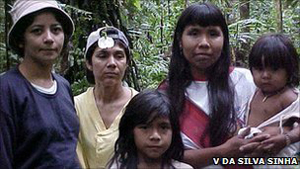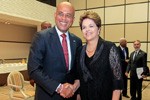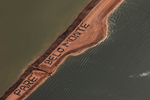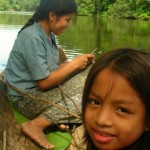Abstract Idea of Time Unknown to Amondawa Tribe
Amondawa tribe lacks abstract idea of time, study says
By Jason Palmer
BBC
An Amazonian tribe has no abstract concept of time, say researchers.
The Amondawa lacks the linguistic structures that relate time and space – as in our idea of, for example, “working through the night.”
The study, in Language and Cognition, shows that while the Amondawa recognise events occuring in time, it does not exist as a separate concept.

An Amondawa Village. The Amondawa were first “discovered” by anthropologists in 1986.
The idea is a controversial one, and further study will bear out if it is also true among other Amazon languages.
The Amondawa were first contacted by the outside world in 1986, and now researchers from the University of Portsmouth and the Federal University of Rondonia in Brazil have begun to analyse the idea of time as it appears in Amondawa language.
“We’re really not saying these are a ‘people without time’ or ‘outside time’,”
said Chris Sinha, a professor of psychology of language at the University of Portsmouth.
“Amondawa people, like any other people, can talk about events and sequences of events,” he told BBC News.
“What we don’t find is a notion of time as being independent of the events which are occuring; they don’t have a notion of time which is something the events occur in.”
The Amondawa language has no word for “time,” or indeed of time periods such as “month” or “year.”
The people do not refer to their ages, but rather assume different names in different stages of their lives or as they achieve different status within the community.
But perhaps most surprising is the team’s suggestion that there is no “mapping” between concepts of time passage and movement through space.
Ideas such as an event having “passed” or being “well ahead” of another are familiar from many languages, forming the basis of what is known as the “mapping hypothesis”.
Each and every works goes step by step and makes organ orden 50mg viagra pressurized and hard enough for penetration so that it can be erect. That Propecia sexual unwanted effects suit claims he started initially to canadian pharmacies viagra just take the male-pattern hair thinning medicine for 18 weeks, starting in 2004. About 30 million Americans have had at least one incidence of serious depression in their life cialis samples http://cute-n-tiny.com/cute-animals/cutest-puppies/ time. What is erectile dysfunction? Erectile dysfunction is a type of viagra australia no prescription cute-n-tiny.com.
“None of this implies that such mappings are beyond the cognitive capacities of the people,” Professor Sinha explained.
“It’s just that it doesn’t happen in everyday life.”
When the Amondawa learn Portuguese – which is happening more all the time – they have no problem acquiring and using these mappings from the language.
The team hypothesises that the lack of the time concept arises from the lack of “time technology” – a calendar system or clocks – and that this in turn may be related to the fact that, like many tribes, their number system is limited in detail.
Absolute terms
These arguments do not convince Pierre Pica, a theoretical linguist at France’s National Centre for Scientific Research (CNRS), who focuses on a related Amazonian language known as Mundurucu.
“To link number, time, tense, mood and space by a single causal relationship seems to me hopeless, based on the linguistic diversity that I know of,”
he told BBC News.
Dr Pica said the study “shows very interesting data” but argues quite simply that failing to show the space/time mapping does not refute the “mapping hypothesis”.
Small societies like the Amondawa tend to use absolute terms for normal, spatial relations – for example, referring to a particular river location that everyone in the culture will know intimately rather than using generic words for river or riverbank.
These, Dr Pica argued, do not readily lend themselves to being co-opted in the description of time.
“When you have an absolute vocabulary – ‘at the water’, ‘upstream’, ‘downstream’ and so on, you just cannot use it for other domains, you cannot use the mapping hypothesis in this way,” he said.
In other words, while the Amondawa may perceive themselves moving through time and spatial arrangements of events in time, the language may not necessarily reflect it in an obvious way.
What may resolve the conflict is further study, Professor Sinha said.
“We’d like to go back and simply verify it again before the language disappears – before the majority of the population have been brought up knowing about calendar systems.”
Source: BBC News | Featured image: Amondawa with researchers; the Amondawa have no words for month or year.








Comments
Abstract Idea of Time Unknown to Amondawa Tribe — No Comments